Why the First Impeachment Matters
Eight lessons about how a second Trump administration will govern
Its been four years since President Trump was first impeached by the House (on December 18, 2019) and then acquitted by the Senate (on February 5, 2020). He was, of course, impeached a second time a year later. The second impeachment looms larger in our memory, given its connection to the January 6th insurrection and the anti-democratic threats that Trump represents. But I want to make the case that the first impeachment is more important in one particular way: it reveals to us how Trump thinks about public power. It tells us how he will govern if he returns to the Presidency.
To recap: The root of the impeachment case was that Trump abused his office for political purposes. He had delayed the release of much needed military funds to Ukraine, making the release of those funds conditional on Ukraine providing information that would hurt his political rival. While the delay of funding became public via the media, the president’s alleged quid pro quo did not emerge until a whistleblower came forward. Trump defended his actions publicly and released a transcript of a phone call with the Ukrainian leader, which only seemed to confirm the quid pro quo.
The impeachment is important partly because it is as close as we can find to a single moment when Trump went all in on loyalty as his primary value in governing. It is after this point that Trump starts imposing loyalty tests on his own appointees, and later signs the Schedule F executive order allowing him to fire career public servants.
Trump’s consistently claimed that he did nothing wrong. We should take him at his word that he believed his actions to be appropriate, and indicative of how he will govern in the future. In many ways, the first impeachment revealed a trial run for an authoritarian presidency. It featured:
the abuse of public office and resources for partisan purposes
political loyalists and Trump lawyers finding ways to justify illegal actions
career officials punished for flagging illegal behavior
the executive branch undermining basic accountability processes
Republicans ultimately deciding to protect Trump from punishment
Trump and his supporters are promising to destroy the administrative state to restore accountability and integrity to government. The details of the first impeachment shows that they want nothing of the sort. Instead, they want a degree of political control of the machinery of government such that they can hide or normalize wrongdoing and illegal behavior. They want to give Trump unchecked power at the expense of public accountability. Here are the eight lessons from the impeachment.
1. Foreign policy driven by Trump’s personal interests
Nowhere has the President greater discretion than in foreign policy, especially when it comes to the deployment of military assets. With the first impeachment, Trump made clear that he viewed foreign policy through the lens of personal advantage. Ukraine would be rewarded if it acted as an appendage to Trump’s re-election campaign. This worldview makes Trump more likely to abandon long-held US policy commitments, like NATO membership, for personal reasons. For a President who has blurred the line between his Presidential office, his political campaigns, and his personal business interests, this is especially dangerous. We recently learned that Trump’s business received millions from foreign governments during his presidency, mostly from China. Russia expects that Trump will end support for Ukraine, and is planning to help Trump in the 2024 election. As Trump surrounds himself with foreign policy loyalists, he would face little constraint to tying American power to his personal gain.
2. Trump will usurp Congressional power
The problem with Trump blackmailing Ukraine was not just the desire to gain political leverage. It was also that this money was not Trump’s to bargain with. Congress holds the power of the purse. If it decides to spend money, Presidents don’t get to ignore it. The Supreme Court have been clear on this point (Train v. City of New York 1975), ruling that a president could not impound (selectively choose not to spend allocated funds) as it effectively gave him budget-making powers that are not found in the constitution. Congress also passed the Congressional Budget and Impoundment Control Act of 1974 to also limit executive abuse of budget power, requiring that presidents explicitly request permission from Congress to not spend allocated funds. Trump, of course, did not do so with the Ukrainian funds.
It’s not just that Trump ignored the Impoundment Act as President. He simply does not believe the Act should constrain him at all. He has pledged that if he is re-elected he will challenge the Act or (less likely) get Congress to overturn it. The argument for presidential impoundment power is to allow Presidents to trim unnecessary spending, sort of like a line-item veto power. But that was not how Trump used it, which was to leverage taxpayer dollars for political blackmail.
3. Trump will surround himself with political hacks driven by conspiracy theories
Much of the focus on Ukraine in the first place arose from the false claim, promoted by Trump and his private lawyer, Rudy Giuliani, that it was Ukraine (and not Russia) that had intervened in the 2016 election. Giuliani, who held no official position, was sent to Ukraine to represent Trump to foreign governments. Out of his depth, Giuliani proved an easy mark for Russian intelligence who used him to pass on misinformation to Trump. Trump was warned by national security officials of this risk, but believed what he wanted to believe.
Giuliani fed, rather than dampened, Trump’s belief that he could leverage the Ukrainian government for damning information. Giuliani was also instrumental in having Marie Yovanovitch recalled. Yovanovitch, the ambassador to Ukraine, was an accomplished career diplomat who could have prevented Trump’s mistakes. Giuliani told Trump that she was impeding Giuliani’s efforts to dig up political dirt damaging to Democrats. This is a very clear instance where amateur partisan actors, unmoored from reality, would have been better off listening to an experienced official who knew what they were doing.
In a future Trump administration, expect more Giuliani-type loyalists, and fewer experts. Trump has been clear that he will surround himself with loyalists who encourage rather than ever push back against his worst instincts.
4. Warnings of lawbreaking will be ignored
Trump asked about withholding the funds, and his Chief of Staff Mick Mulvaney put the process in motion. The hold on the funds required action from the Office of Management and Budget (OMB), then run by Russ Vought.
Career officials and some political appointees raised red flags about both the logic and legality of the hold on aid. Trump loyalists overruled them. Two career lawyers at OMB objected and resigned. One recalled asking an OMB political appointee, Michael Duffey, about why the funding was being withheld. “He didn’t provide an explicit response on the reason. He simply said we need to let the hold take place — and I’m paraphrasing here — and then revisit this issue with the president.” Duffey had sent out a message 90 minutes after Trump’s call to Zelensky making clear the money needed to be held up, while also telling officials not to disclose information about the hold.
The OMB career official who normally oversaw such work was removed from the process when he questioned how the aid could be withheld while still complying with the Impoundment Act. Duffey, the political appointee, was put in charge. The same career aide would be the only one of a number of OMB officials subpoenaed who actually testified to the House of Representatives as part of its impeachment inquiry.
Appointees at the National Security Council and State Department protested the hold. A senior career financial official at the Department of Defense also flagged concerns, asking if the decision to hold money had been approved by Defense legal counsel. She explained consistently for months that the delay would make it impossible to release funds in a way consistent with the law. Once the news of the funding hold broke, OMB appointees drafted a letter that tried to shift blame to career staff at the Department of Defense, to which she responded “You can’t be serious. I am speechless.”
Trump could have avoided the impeachment if he simply listened to career officials who told him that his hold was both illegal and contrary to US policy. Instead, loyalists saw no need for any public interest justification for doing so. If Trump wanted to withhold the money, so be it. If it was illegal, what of it?
These are the type of loyalists who will return in a second Trump administration. Vought, the OMB chief who blessed the withholding of aid, has been plotting about how Trump can use power in a second term. More than anyone, he has pushed the trope of the “weaponization” of government against Trump. As an official he was engaged in exactly this type of weaponization, using public power for illegal and partisan ends. Before he left his position he tried to convert almost 90% of OMB career staff into appointment positions so that Trump could fire them. He is slated to play a senior role in a second Trump administration, when he can put is weaponization theories into full effect.
5. Trump lawyers will invent legal justifications for wrongdoing
The most obvious legal interpretation of the Impoundment Act is that the Trump could not withhold aid. But this was inconvenient, and so a new legal interpretation was needed. Between them, Trump lawyers at the White House and OMB dreamt one up. They proposed that the president can violate the law in cases when national security is at risk. The Bush administration drew extensively on this sort of logic – with secret legal memos – to justify surveillance of its citizens and acts of torture of detainees as part of the war on terror. Here, it was now being used when there was no meaningful national security risk.
In other words, some “creative” Trump lawyers came up with a legal justification that they would not admit to publicly, and where the basic facts (national security risks) did not match the situation. In defending Trump, his lawyers drew on unitary executive theory, a relatively novel reading of the constitution which holds that the President is the embodiment of the executive branch and has almost King-like powers.
Trump wants to populate a second administration with such lawyers: those who are loyal to Trump, believers in unitary executive theory, and not afraid to get creative. Lawyers who will transform Richard Nixon’s dictum “Well, when the president does it, that means that it is not illegal” from a fiction to a reality.
Mark Paoletta (hanging out with Justice Thomas below), the OMB General Counsel who played a leading role in blessing Trump’s illegal actions, is touted as a model of the type of lawyer Trump is looking for. Paoletta also facilitated the illegal use of funds during the government shutdown according to the GAO. And he rerouted Congressional funding to a border wall they never approved. For a Supreme Court concerned about limiting the administrative state, this would seem like a problem. But apparently not. Which may be what we see with a second Trump administration: a Supreme Court willing to embrace unitary executive theories when presented to them by their ideological allies.
6. Trump will evade accountability at every turn
There are a variety of ways that a President can establish accountability for his actions. The most obvious is elections. Trump has repeatedly rejected the legitimacy of the election he lost. If he returns as President, without any need to face another election, there is no reason to believe he will respect other accountability processes.
At the most most basic level, an accountable President acknowledges and provides a rationale for his actions. The Trump administration kept the hold on the Ukraine aid secret as long as they could. They made no effort to justify these actions publicly as they undertook them. Eventually, the aid was released as news organizations reported on it, and Trump proved unwilling to justify his actions because his position was indefensible. Within the executive branch he could simply demand a hold, and ignore critics. On the public stage, he was unable to do so. Trump wants less accountability, and more secrecy, despite the fact that without accountability he will no longer offer even the pretense of acting in the public interest.
There is also legal accountability. The White House did not follow the Impoundment Act. Indeed, it sought to ensure Congress did not discover the failure to spend for as long as possible.
The US system of government also rests on a model of accountability where the legislative branch has an important oversight role over executive action. Trump denies the validity of this role. Once the impeachment process started, the Trump administration refused to provide any requested documents as part of the impeachment inquiry, and forbade executive branch officials or even former officials from testifying. Given what we know now, this was an obvious attempt to cover up violations of the law for purely partisan purposes.
Such outright dismissal of Congressional oversight is an extraordinary rejection of the American model of constitutional accountability, but it was not unusual under Trump, even before the impeachment. Trump lawyers at the Office of Legal Counsel aggressively denied the right of Congress to expect co-operation from Trump in its investigations. This lack of cooperation with standard accountability processes would itself form the basis for an article of impeachment.
In a future Trump administration, such stonewalling would become the norm.
7. Formal whistleblower processes will not be respected
Only a handful of Trump appointees were aware of both the efforts to extort political information from Ukraine and the withholding of aid. The case for blackmail required connecting the two. One CIA officer was aware of both strands. And so he did what officials are supposed to do in such situation, which is to rely on formal whistle-blower processes to report suspected wrongdoing.
The whistleblower filed the complaint on August 12. The Inspector General for the intelligence community viewed the complaint to be credible and of “urgent concern” and therefore should be conveyed to Congress. It was not until September 9 that information that the complaint even existed was conveyed to Congress. The acting Director of National Intelligence, Joseph McGuire, then refused a subpoena to provide the complaint, which was not released until September 26, after the impeachment investigation began. White House lawyers had initially blocked the release of the complaint by overruling the Inspector General’s judgment that the complaint was of “urgent concern.” Given that they complaint involved a time-specific withholding of Congressional funding, the idea that it was not “urgent” defies belief. It is one of a series of examples of Trump appointees at the White House Office of Legal Counsel developing decisions that defied common sense, but served to protect Trump.
Throughout the impeachment process, Trump and fellow Republicans attacked the whistleblower. Whistleblowers have historically been given a right to anonymity under the Whistleblower Protection Act. But Rand Paul named the alleged whistleblower on the Senate floor. And Trump retweeted a post naming the alleged whistleblower.
The message was clear. Any official that followed the formal and legal processes of revealing potential wrongdoing can expect a Trump White House to try to bury the complaint, and failing that, retaliation from the President and his party.
8. Career officials who do the right thing will be vilified and hounded from office
It was not just the whistleblower. The president publicly attacked Yovanovitch, who retired. Another State Department official to also resigned when their Secretary of State Mike Pompeo failed to defend Yovanovitch
Career public servants who agreed to testify were also subject to public attack, not just from Trump but from other high profile Republicans too. When the impeachment concluded, the White House swiftly delivered on a promise of payback to those who had testified, retaliating against career civil servants who had not yet resigned by removing them from their positions, blocking promotions, or demoting them to the degree allowed by law. The Department of Defense finance official who had raised concerns about the legality of withholding the Ukraine funds saw her nomination to a senior position pulled. She soon left government. A White House military official, Alexander Vindman, who testified to Congress was removed from his position. He later resigned. Trump fired the Inspector General who had informed Congress of the whistleblower complaint. Such officials were characterized by the president and his supporters as part of a deep state conspiracy to remove him. The atmosphere could hardly have been more hostile to any official wishing to share evidence of Trump’s misdeeds.
Trump has shown us he has no aversion to firing and attacking officials who follow legal processes to report his illegal behavior, or are willing to testify to Congress. With Schedule F, it will be much easier for him to do so, and much less likely that such officials will take the risk of informing the public of wrongdoing. The ability of the public to learn about wrongdoing taking place in the executive branch would be weakened.
Congress will not stop an authoritarian Presidency
The Senate declined to convict Trump. Only one Republican, Mitt Romney, voted to do so. Despite Trump’s absolute indifference to legislative accountability, partisan interests won out. The Senate Majority Leader, Mitch McConnell signaled he would work in “total coordination” with a White House that was refusing to co-operate with the investigation. Before the trial started, and, breaking with all previous impeachment trials, McConnell refused to call additional witnesses or seek documents. Republicans thought so little of the impeachment that they would later vote to approve Trump nominees who had defied Congressional subpoenas to testify. Party loyalty trumped protecting the institutional prerogatives of Congress.
While we have discussed how Trump would act in a second administration, the final lesson is about what Congress will do. There is almost no prospect that Congress will meaningfully hold Trump accountable for whatever he does in office.
A Democratic House can impeach Trump as many times as they want, but without the 67 Senate votes for conviction, none of it matters. While Trump’s withholding of aid to Ukraine told us more about how he will use power in a future administration, it paled in comparison to the charges for his second impeachment: inciting an insurrection. But even here, only seven Republican Senators voted to convict, and of those, only three will be in the Senate next year.
The Republican Party, and by extension, Congress, is unwilling and unable to stop Trump’s authoritarian tendencies. If he returns to power, Trump will pursue the mode of governing that led to his first impeachment with greater support from his party, stronger tools to ensure control of the executive branch, and more confidence than neither the courts nor Congress will stop him. This is the reality of what Trump’s attack on the “deep state” amounts to: a promise to engage in unchecked authoritarianism.



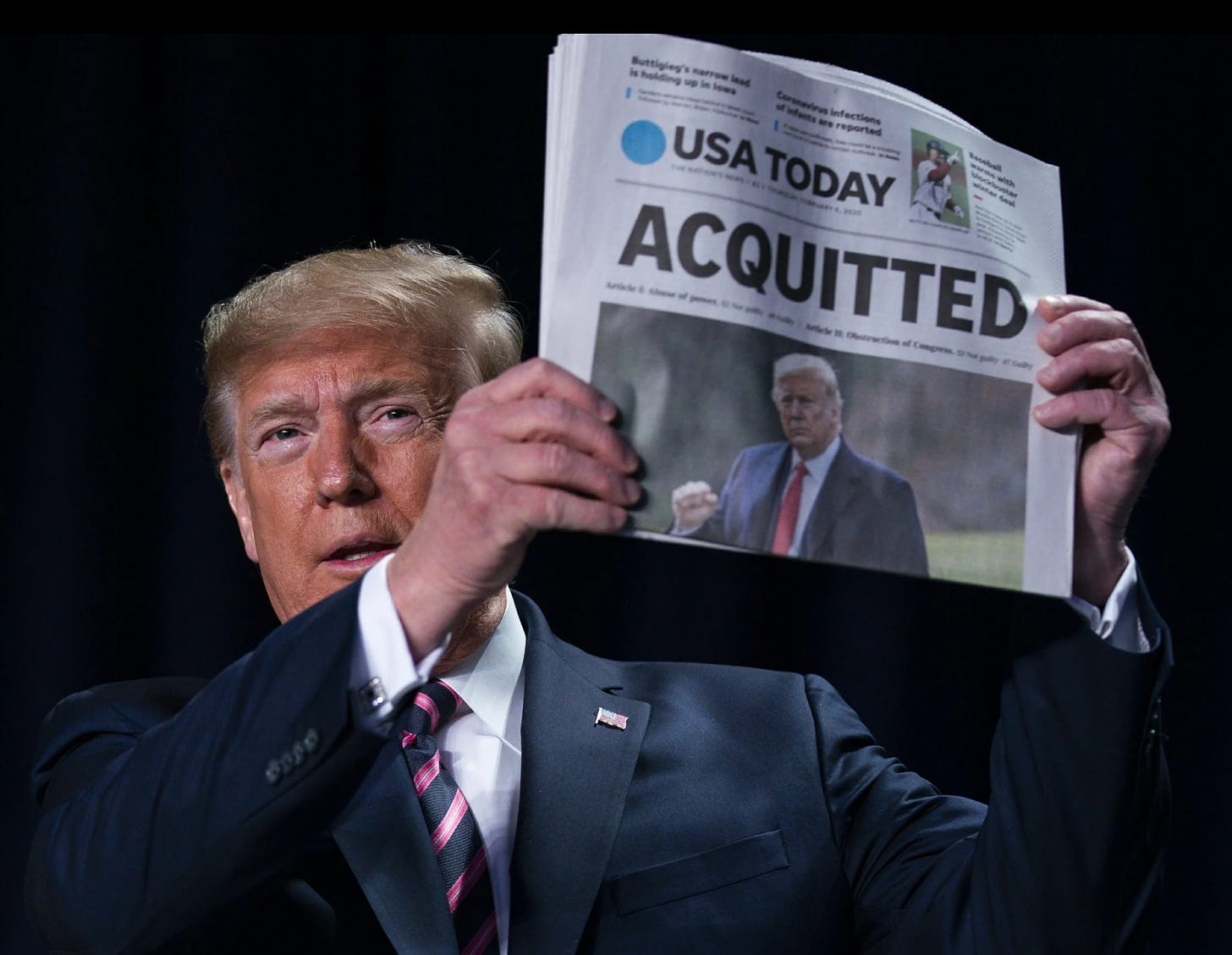
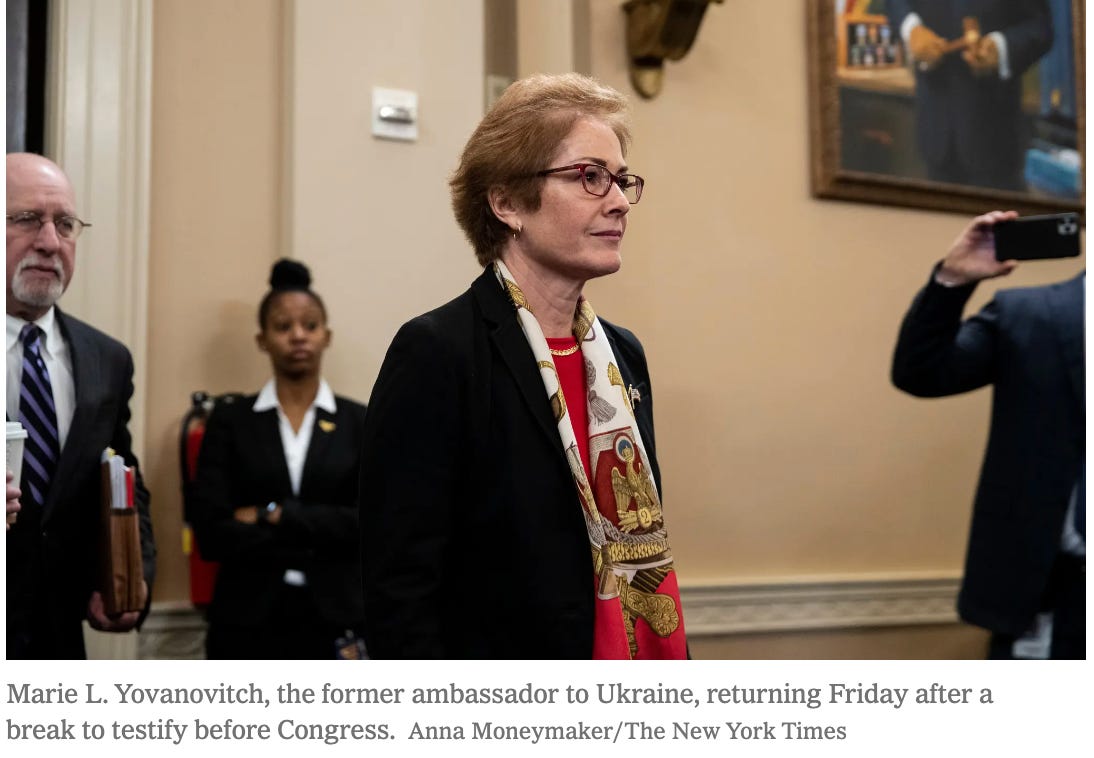
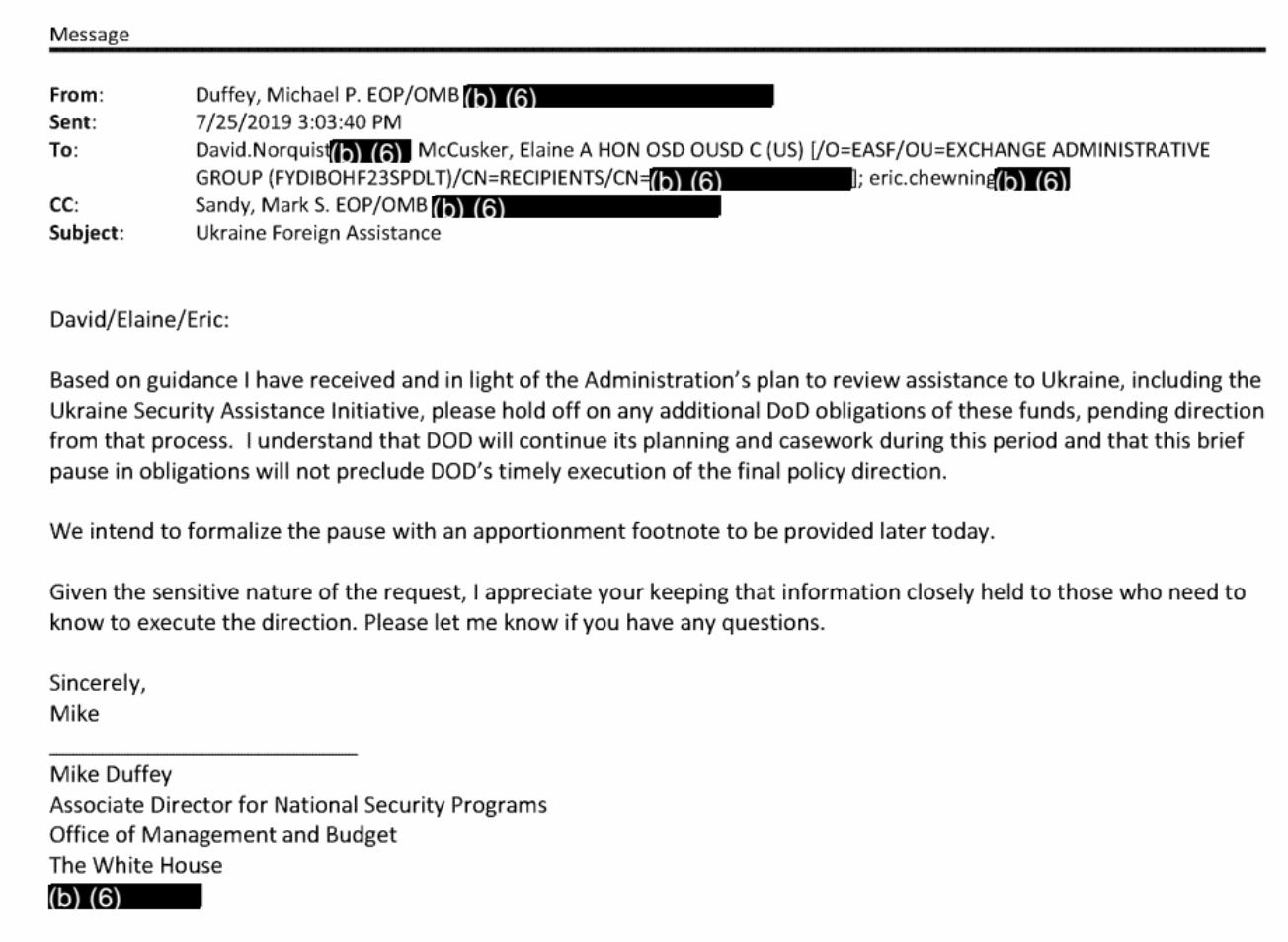
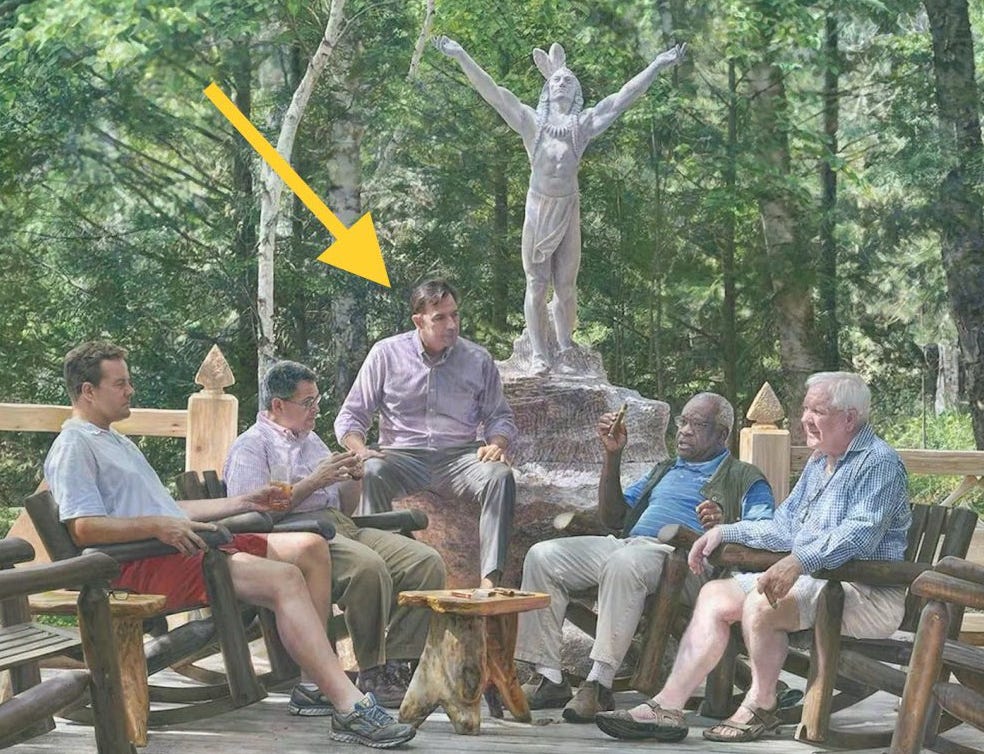
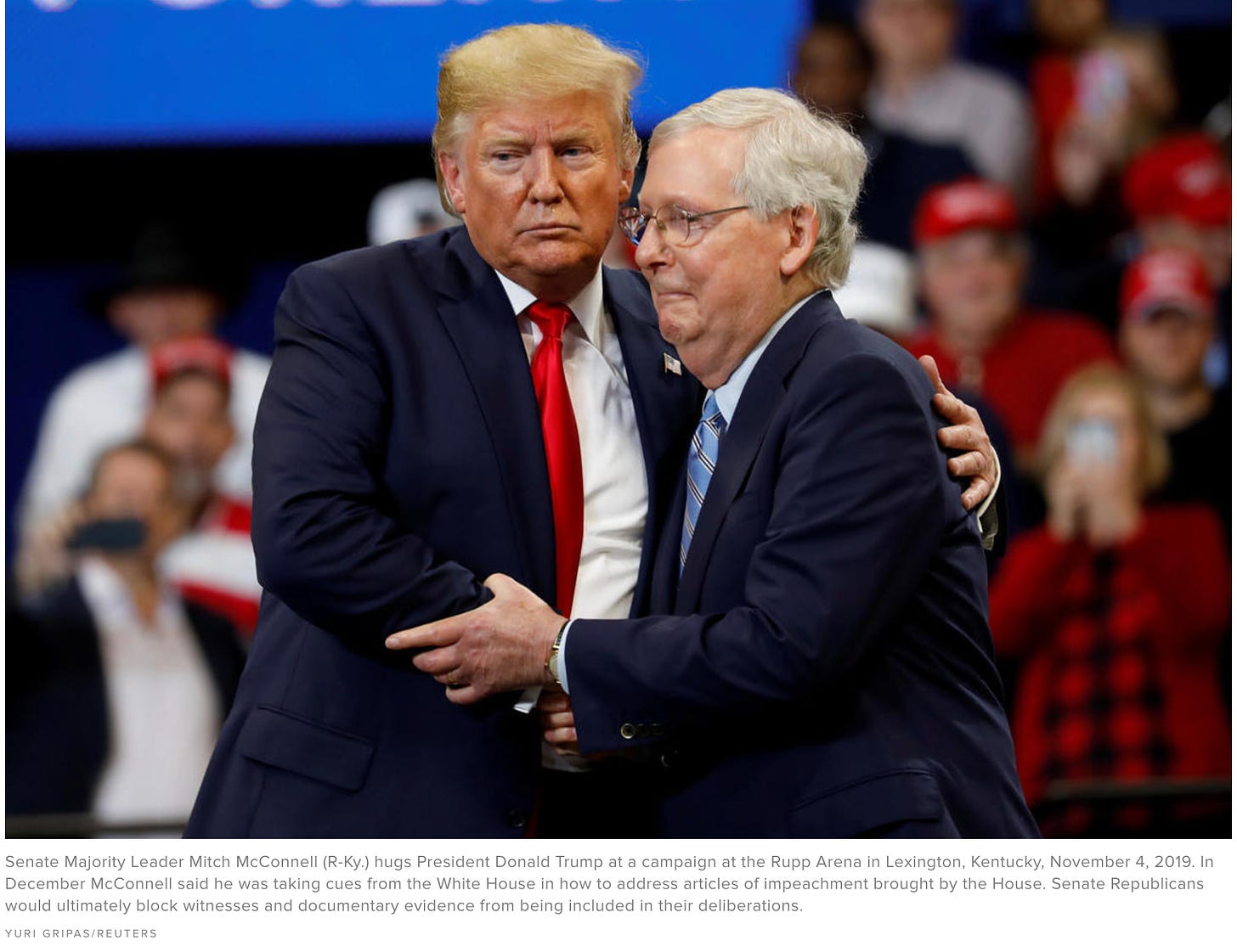
You got it on record. thanks.
Great summary and discomforting. It is imperative that we vote Blue, up and down the ballot, because Republicans cannot be counted on to be concerned about democracy.